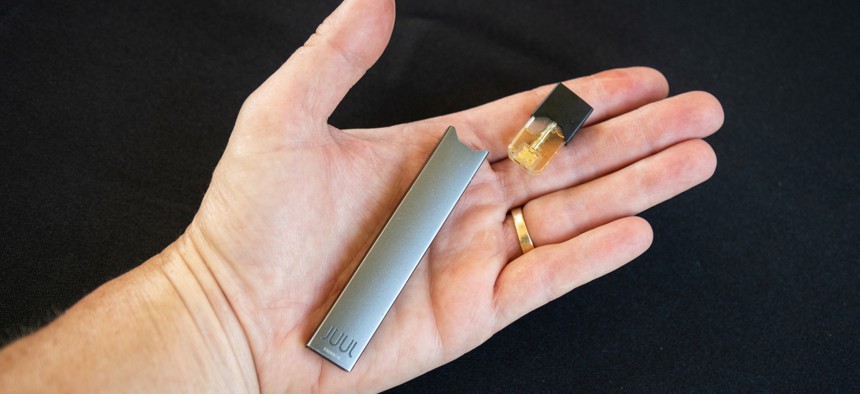New Survey Finds Big Increase in U.S. Teen Vaping

A hand holding an e-cigarette that was found at a 2018 high school graduation ceremony in California. Shutterstock
One in five high school seniors vaped in 2018.
The U.S. Food and Drug Administration is taking action against e-cigarette companies out of fear that vaping by teens is skyrocketing. New data from this year’s Monitoring the Future survey suggests it’s true.
Between 2017 and 2018, the nationally representative survey of 13,850 teenagers found that the number of 12th graders who had vaped nicotine in the past 30 days grew by nearly 50%. In 2017, roughly one in 10 seniors had vaped, and in 2018, that number was roughly one in five. The jump from 11% to 21% is the largest increase among 12th graders using any substance in the survey’s 44 years.

The survey, funded by the National Institute on Drug Abuse, has been conducted annually since 1975 by researchers at the University of Michigan (surveys on 8th and 10th grades only began in 1991). This year’s results reflect a trend the National Youth Tobacco Survey highlighted earlier this year, which found that the total number of high-school students who reported vaping in the past 30 days more than doubled.

“The policies in place as of the 2017 [to] 2018 school year were not sufficient to stop the spread of nicotine vaping among adolescents,” the authors of the Monitoring the Future survey wrote in an accompanying commentary published in the New England Journal of Medicine.
There are two two main health concerns with adolescent vaping. First, there’s limited evidence that the chemicals in vape cartridges—particularly the sweetly flavored cartridges—are completely safe. As Quartz previously reported, researchers have found entirely new compounds created when the chemicals in cartridges are vaporize and preliminary work has shown that some of the known compounds found in vapes can irritate immune cells within the lungs. Second, authorities are worried that vaping nicotine could lead to smoking tobacco cigarettes later on. However, it’s not yet clear that this claim is valid—a review published earlier this year suggested that e-cigarettes could actually be helping cigarette use fall among teens.
Nevertheless, these concerns led the FDA to take some action regulatory action against e-cigarettes and other tobacco products earlier this fall. In November, the regulatory agency announced that e-cigarettes could only be sold in stores in areas closed off to minors, although it’s already illegal to sell to people under the age of 18. Additionally, it’s now focusing on banning menthol cigarettes and flavored cigars.
Katherine Ellen Foley is a reporter at Quartz, which originally published this article.
NEXT STORY: Crime and Murder Rates Drop in Most Big Cities





